|
|
|
Sort Order |
|
|
|
Items / Page
|
|
|
|
|
|
|
| Srl | Item |
| 1 |
ID:
126046
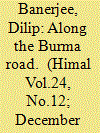

|
|
|
|
|
| Publication |
2011.
|
| Summary/Abstract |
Yunnan was one of the worst-hit areas during World War II, almost completely destroyed by Japanese bombing. By today the province has been rebuilt, however, and the old Burma Road - that icon of the war, used to transport support material for the Allies into China - has been upgraded into a six-lane highway. Once it crosses the Chinese border, however, this potentially lucrative land link between China and India falls into disrepair, despite years of plans to upgrade it. On the Indian side, the Ledo Road (or Stilwell Road, after an American general), links up to the Burma Road, and is indeed motorable. But it too falls into disrepair on the Burma side.
|
|
|
|
|
|
|
|
|
|
|
|
|
|
|
|
| 2 |
ID:
133377
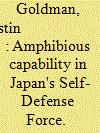

|
|
|
|
|
| Publication |
2014.
|
| Summary/Abstract |
Today the Japanese face an increasingly complex regional-security environment, particularly along the southwestern islands, where incursions by Chinese government vessels are increasingly occurring in what Japan claims as its territorial waters. The security of offshore islands has developed as an area of focus within Japanese defense planning, and Japan has begun building up modest island-defense capabilities.1 Although the nature and range of threats faced have evolved, a core focus of the Japan Self-Defense Force (JSDF ) remains the same- the requirement to protect the nation from an amphibious invasion.2 While the JSDF has developed some robust platforms, its current state also reflects the constraints placed on its development under the 1947 constitution, enacted during the occupation following World War II. …
|
|
|
|
|
|
|
|
|
|
|
|
|
|
|
|
| 3 |
ID:
127712
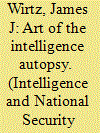

|
|
|
|
|
| Publication |
2014.
|
| Summary/Abstract |
Although intelligence postmortems are a common practice in the aftermath of intelligence failure, little is known about how they are conducted. This article explores the methodology employed by Robert Jervis in intelligence postmortems that followed the fall of the Shah of Iran in 1979 and the formulation of the 2002 Iraq national intelligence estimate that warned of the possibility that Iraq had restarted its nuclear program. The analysis reveals the challenges faced by scholars as they attempt to assess why analysts failed to offer accurate estimates and the way contemporary international relations theory can be applied to the realm of policy. The findings of the postmortems also shed light on areas where additional collaboration among scholars and analysts can advance the art of intelligence analysis.
|
|
|
|
|
|
|
|
|
|
|
|
|
|
|
|
| 4 |
ID:
128550
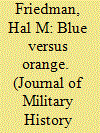

|
|
|
|
|
| Publication |
2014.
|
| Summary/Abstract |
In the fall of 1945, the United States Naval War College (NWC) began its transition from a reduced wartime status to a peacetime stance as the Navy's premier postgraduate school. Because the war ended so quickly, the NWC was not able to change its curriculum for 1945-1946, which had been planned the previous academic year. It is therefore not surprising to find that the primary supposed enemy for Blue (the United States) in the coming academic year was still Orange (Japan). This study looks at the Operations Problems simulated at the immediate end of the war and explores the mix of interwar and wartime doctrine that was employed to prepare for the early Cold War.
|
|
|
|
|
|
|
|
|
|
|
|
|
|
|
|
| 5 |
ID:
132185
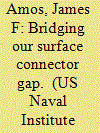

|
|
|
|
|
| Publication |
2014.
|
| Summary/Abstract |
In a new strategic environment, the Marines' ability to expeditiously get people and equipment ashore may be more important than ever. Emerging platforms and technologies promise to be game-changers.
|
|
|
|
|
|
|
|
|
|
|
|
|
|
|
|
| 6 |
ID:
133799
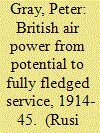

|
|
|
|
|
| Publication |
2014.
|
| Summary/Abstract |
The First World War set British air power on a path of development that by 1939 made an essential contribution to the conduct of war
At the start of the First World War, the potential of air power for military purposes had already been identified but remained largely underdeveloped, with Britain lagging behind some of its direct European competitors. Peter Gray traces how the First World War acted as a catalyst for British forces to use air power in attack and reconnaissance roles, and unleashed the potential for its further development during the interwar years. By the Second World War, air power had become an indispensable element of warfare.
|
|
|
|
|
|
|
|
|
|
|
|
|
|
|
|
| 7 |
ID:
133798
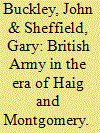

|
|
|
|
|
| Publication |
2014.
|
| Summary/Abstract |
Negative myths about the British Army's performance, especially during the Great War, obscure the reality of an institution that learned and improvide throughout both world wars
The performance of the British Army in the two world wars has been the subject of much scrutiny in both scholarly and popular history. The latter has long been dominated by the perception of an underperforming army fighting under incompetent leadership in a futile First World War, in contrast to a more successful and effective force supporting a just cause in the Second. Yet, John Buckley and Gary Sheffield argue, sound scholarly research paints a much more nuanced picture of an institution that between 1914 and 1945 underwent a rich learning process that must be understood in its entirety.
|
|
|
|
|
|
|
|
|
|
|
|
|
|
|
|
| 8 |
ID:
133418
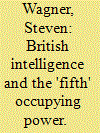

|
|
|
|
|
| Publication |
2014.
|
| Summary/Abstract |
At the end of the Second World War, British intelligence struggled to enforce strict limits imposed on Jewish immigration to Palestine. Holocaust survivors and Jews wishing to escape communism in Eastern Europe flooded the western Zones of occupation in Germany and Austria, while the Zionist movement worked to bring them to Palestine. Illegal immigration to Palestine was the key policy dispute between Britain and the Zionist movement, and a focus for British intelligence. Britain sought both overt and covert means to prevent the boarding of ships at European ports which were destined for Palestine, and even to prevent the entry of Jewish refugees into the American zones. This article highlights Britain's secret intelligence-gathering efforts as well as its covert action aimed to prevent this movement. It highlights a peculiar episode in the 'special relationship' between Britain and the United States, during which cooperation and partnership was lacking. British intelligence promoted a rumour that Soviet agents were using Jewish escape lines to penetrate Western Europe and the Middle East in order to persuade American authorities to prevent the movement of Jewish refugees. Instead, this article argues, American intelligence secretly cooperated with the Zionist organizers of the escape routes so to expose Soviet agents. Britain's attempt at deception backfired, and provided effective cover for the movement of hundreds of thousands of Jews during a critical period. Meanwhile its intelligence had dramatically improved, but policymakers failed to reassess Britain's ability to sustain immigration restrictions and the indefinite detention of tens of thousands of illegal migrants.
|
|
|
|
|
|
|
|
|
|
|
|
|
|
|
|
| 9 |
ID:
124743
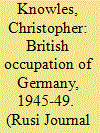

|
|
|
|
|
| Publication |
2013.
|
| Summary/Abstract |
Britain began to plan for the occupation and reconstruction of Germany following the end of the Second World War as early as 1944. However, such was the devastation as a result of intensive fighting that went all the way to Berlin that these plans were unsuited to the reality on the ground in May 1945. Christopher Knowles explores the first four years of 'benevolent occupation' in the British zone under the leadership of Field Marshal Montgomery and his successors, noting that positive effect was more likely where they created the conditions for the German people to act for themselves, rather than imposing solutions by force or decree.
|
|
|
|
|
|
|
|
|
|
|
|
|
|
|
|
| 10 |
ID:
132004
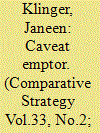

|
|
|
|
|
| Publication |
2014.
|
| Summary/Abstract |
Although intuitively social science has much to contribute to strategy, this article examines the difficulty for strategists doing so. To illustrate the difficulty, the article draws on two social science theories that provided conceptual frameworks for U.S. strategy in the 1960s: deterrence/coercion theory and modernization theory. The article also draws on the cases of Project Camelot in the 1960s and the recent use of human terrain teams to illustrate the difficulty encountered by the military when it tries to use social scientists operationally.
|
|
|
|
|
|
|
|
|
|
|
|
|
|
|
|
| 11 |
ID:
132579
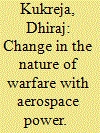

|
|
|
|
|
| Publication |
2014.
|
| Summary/Abstract |
There is nothing more difficult to carry out, nor more doubtful of success, nor more dangerous to handle, than to initiate a new order of things - Machiavelli
There has been a continuing transformation in the art and science of war ever since the aircraft was first used as a weapon of war, and then with the adoption of technological excellence. The use of the third dimension to enhance military capabilities had developed and settled during World War II. Gen Eisenhower put emphasis in his words when he stated, "The Normandy landings were based on a deep-seated faith in the power of the air force in overwhelming numbers to intervene in the land battle." Ever since that era, aviators, the world over, have been putting forth their case that air power should hold centre-stage in any war.
|
|
|
|
|
|
|
|
|
|
|
|
|
|
|
|
| 12 |
ID:
133841
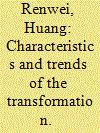

|
|
|
|
|
| Publication |
2014.
|
| Summary/Abstract |
The characteristics of the transformation of the contemporary international system are unprecedented since the birth of the Westphalian system, and even since the end of world war - II and cold war. The transformation of the contemporary international system is reflected firstly in the structural changes to international power, namely the transfer of power. The transfer of power and the transformation of the international order were accomplished through war throughout modern history
|
|
|
|
|
|
|
|
|
|
|
|
|
|
|
|
| 13 |
ID:
128720
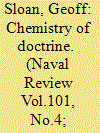

|
|
|
|
|
| Publication |
2013.
|
| Summary/Abstract |
In this the concluding part of his series on the chemistry of doctrine, the author examines the further evolution of naval doctrine during the second world war, with specific reference to the battle of Atlantic . He concludes by surveying the whole three part series and drawing some enduring lessons and principles.
|
|
|
|
|
|
|
|
|
|
|
|
|
|
|
|
| 14 |
ID:
133853
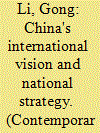

|
|
|
|
|
| Publication |
2014.
|
| Summary/Abstract |
The global order was set in place following the end of the Second World War by a consortium of western countries headed by the U. S. since then, major western countries have strived to maintain their long dominance in global politics and economics. With the rise of nationalist movements, former colonies gained their independence, and many developing countries joined the UN in recent years the economies of the emerging powers have grow rapidly and they have also joined WTO.
|
|
|
|
|
|
|
|
|
|
|
|
|
|
|
|
| 15 |
ID:
131790
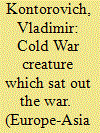

|
|
|
|
|
| Publication |
2014.
|
| Summary/Abstract |
A substantial body of literature argues that government funding motivated by the Cold War shaped (or distorted) the content of the American academic disciplines. This article tests the impact of such funding on the academic study of the Soviet economy, a small field created to help fight the Cold War. It documents the amount of attention given by researchers to the military sector of the Soviet economy, the topic of central importance for the Cold War, and finds that their publications largely ignored it. Considerations other than the interests of the sponsors determined the choice of topics in the discipline.
|
|
|
|
|
|
|
|
|
|
|
|
|
|
|
|
| 16 |
ID:
134099
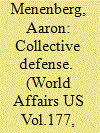

|
|
|
|
|
| Publication |
2014.
|
| Summary/Abstract |
Since the end of World War II, Japan has relied on the United States for its security, an arrangement enshrined in the US-written Japanese Constitution of 1947 and augmented by subsequent agreements between the two allies. Article IX of the Constitution prohibits Japan from taking part in any conflict or building a traditional military. (When President George H.?W. Bush organized the "coalition of the willing" against Iraq in 1991, Japan was able only to offer financial assistance because of this stipulation.) But with the rise of China and its assertion of sovereignty in regions Japan claims as its own, Tokyo has begun to expand its military capability. Some government officials wonder how these moves will affect relations with the United States, Japan's protector for the last half-century.
|
|
|
|
|
|
|
|
|
|
|
|
|
|
|
|
| 17 |
ID:
133302
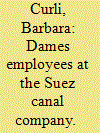

|
|
|
|
|
| Publication |
2014.
|
| Summary/Abstract |
The article is a case study of work organization at the Services d'Egypte of the Suez Canal Company from the outbreak of World War II to the company's nationalization in 1956. In this multinational and multicultural workplace, organizational hierarchies and division of labor were traditionally defined according to "national" identities, while maintaining a strict segregation between européens and indigènes, to use the company's terminology. Starting in the 1930s, the company faced new measures of economic nationalism imposed by the Egyptian government, including required quotas of Egyptian personnel. These measures progressively redefined the political boundaries of the company's action in the management of its workforce. Using unpublished archival documents from the company's personnel files, this article analyzes the processes of feminization and Egyptianization of the company's office workers during World War II and the 1950s. The process was driven by a precise organizational strategy, based on both "racial" and "gender" criteria, which aimed to redefine the company's internal hierarchies and to keep management and decision making in the hands of the "Europeans," while complying with the terms of the conventions of 1937 and 1949 that regulated the relationship between the company and the Egyptian government.
|
|
|
|
|
|
|
|
|
|
|
|
|
|
|
|
| 18 |
ID:
124744
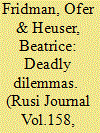

|
|
|
|
|
| Publication |
2013.
|
| Summary/Abstract |
Since the second world war, counter insurgency and counter terrorism operations have become much more frequent and widespread than large scale conventional confrontation. While at first three was a widespread perception that relatively small badly trained and poorly equipped groups.
|
|
|
|
|
|
|
|
|
|
|
|
|
|
|
|
| 19 |
ID:
133420
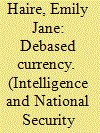

|
|
|
|
|
| Publication |
2014.
|
| Summary/Abstract |
Using memoirs can be a vital way of supplementing archival evidence or indeed of overcoming a shortage of contemporaneous sources, and they offer insights into the attitudes and motivations of participants as well as how they recorded and remembered events. Memoirs retain an inherent value that must not be ignored, particularly in the study of intelligence liaison which addresses the kinds of personal and cultural aspects which are often especially well illuminated through autobiographical writing. This paper explores some of the theoretical and practical issues associated with the use of memoir material and examines them through the prism of selected autobiographical writings related to Anglo-French intelligence liaison from the Great War up to the Second World War.
|
|
|
|
|
|
|
|
|
|
|
|
|
|
|
|
| 20 |
ID:
124650


|
|
|
|
|
| Publication |
2013.
|
| Summary/Abstract |
The United States is now in a period of austerity, and after years of huge increases, the defense budget is set to be scaled back. Even those supporting the cuts stress the need to avoid the supposedly awful consequences of past retrenchments. "We have to remember the lessons of history," President Barack Obama said in January 2012. "We can't afford to repeat the mistakes that have been made in the past -- after World War II, after Vietnam -- when our military policy was left ill prepared for the future. As commander in chief, I will not let that happen again." Similarly, then Secretary of Defense Leon Panetta told Congress in October 2011, "After every major conflict -- World War I, World War II, Korea, Vietnam, the fall of the Soviet Union -- what happened was that we ultimately hollowed out the force. Whatever we do in confronting the challenges we face now on the fiscal side, we must not make that mistake."
|
|
|
|
|
|
|
|
|
|
|
|
|
|
|
|
|
|
|
|
|